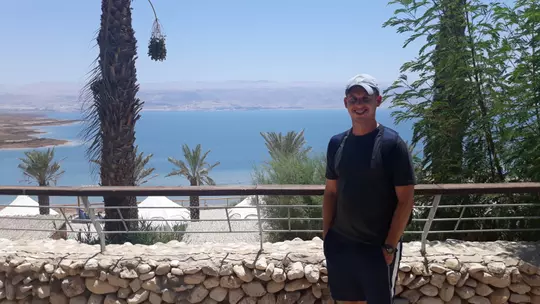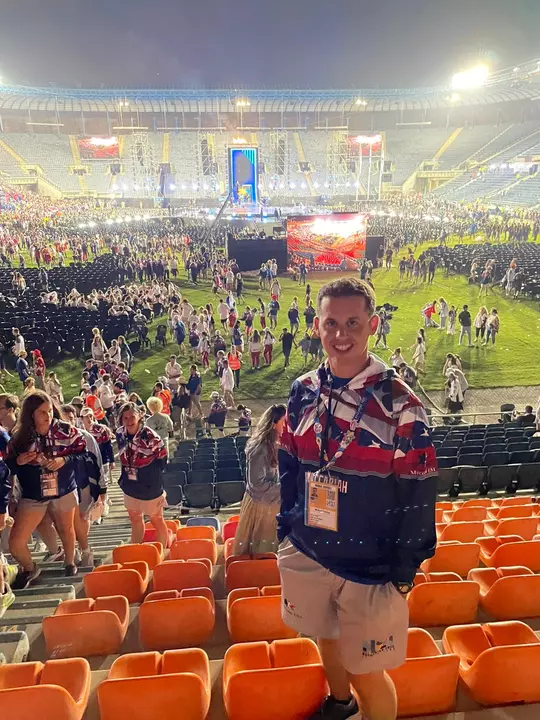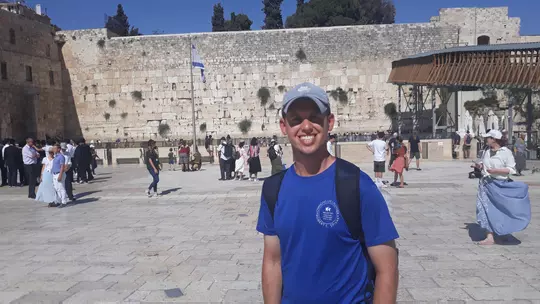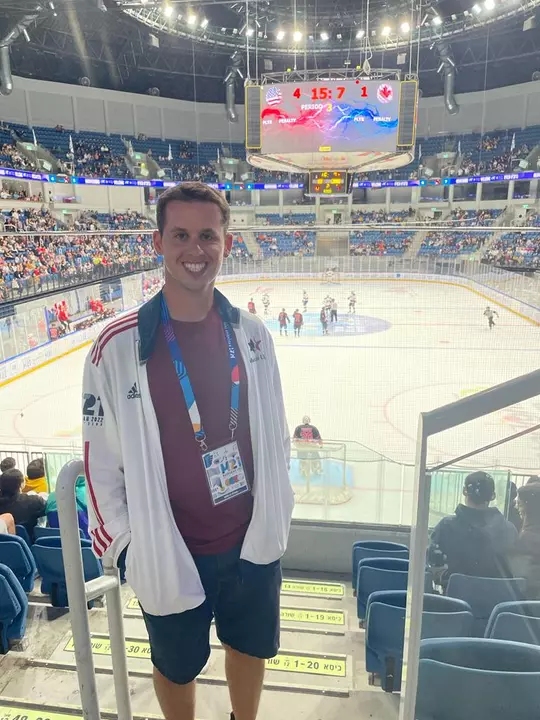
Experience at the Maccabiah Games Leads to Professional Development for Presburger
Preston Jones
On a day-to-day basis, Yosef Presburger serves as the Tennessee Men’s and Women’s Tennis Assistant Athletic Trainer. This summer, he took his skills to Israel to volunteer for the Team USA medical team at the 21st Maccabiah Games.
Presburger joined Tennessee as an Assistant Athletic Trainer with Tennessee Men’s and Women’s Tennis in June of 2021. Prior to that, he worked as an Intern Athletic Trainer with both tennis teams during the 2020-2021 season.
The Maccabiah Games are quadrennial Jewish Olympics that serve as Israel’s largest sporting event. The Games provided him the opportunity to broaden his horizon and experience the athletic training field in a new way.
“One of the cool things was that I got to see other athletic trainers from different backgrounds work,” Presburger said. “I think in my profession, we learn by watching and talking to people that do things differently than us. That certainly gives you more perspective. It was a very refreshing trip. It may have been exhausting at times, but it was very refreshing professionally to see something different. It’s hard to put into words, but I definitely came back more mature as a clinician and as a professional simply due to the fact that I met so many people. It was probably the same for them when they met somebody who works at Tennessee. It’s just something different.”

The Games hosted around 10,000 participants from around world during the two weeks of competition. The U.S. medical team was made up of over 20 athletic trainers from all over the United States—from California and Alaska to the northeast states and, of course, Tennessee.
“Along with athletic trainers, we had physicians and mental health professionals come with us as well,” Presburger said. “I was part of that team. I was doing the same things I do here at Tennessee—pre-practice or pre-match treatments, covering matches and games and then being available for whatever medical needs arise for all the athletes.”
Growing up in the Jewish community and doing sports, I always knew of the Games. My dad actually competed in squash when he was younger. So, that was always a dream of mine—Olympics, Maccabi Games and Grand Slams. I wanted to go and play those. Obviously, I wasn’t good enough for that, but it was always something I wanted to be involved with. When I was in high school I participated in the JCC Maccabi Games, which are a smaller version here in the U.S. Fast forward a few years, and in my first year here I was talking to Coach (Alison) Ojeda because she actually coached the tennis team in 2019 for the Pan-American Games in Mexico City. It came up that she’s Jewish and I’m Jewish. She said, ‘You could work now as an athletic trainer for the Maccabi Games.’ That’s kind of when it first got to me. I realized, ‘I can actually go now. I’m not playing, but I can go work them.’ From there, she put me in contact with a couple of people and I applied.Yosef Presburger
The three-week trip included one week of training camp, followed by two weeks of competition. During the training camp, groups had early mornings in which Presburger joined the U.S. delegation at practices and provided treatments as needed. In the afternoons, the group had sightseeing opportunities which included a visit to Masada, an ancient fortress, and a float in the Dead Sea. They also paid a visit to Jerusalem, viewing religious sites and receiving some valuable history lessons. Finally, the group visited Tel Aviv, taking in the sights and sounds of the modern city that sits along the Mediterranean.
Once the second and third weeks arrived and the Games officially began, Presburger provided athletic training coverage for several events, with the option to explore the nation in the evenings.
“There were hubs and different hotels and sites,” Presburger said. “Our delegation was over 1,000 people, so you can’t put everyone at the same hotel. Also, the training facilities were in different cities. The first week we were in one hub. That week, I got to work with a different team each day. I did tennis, swimming, karate and fencing. At the hotel, we also had softball, weight lifting, wrestling and judo, among other sports. For treatments, I would see those people too. When we moved to the Games, I was mostly providing coverage for tennis, but I got to help out with men’s and women’s soccer a little bit as well. We also had track and field at the hotel, so I got to do some treatments with them. Once the games started, though, I would say I was with tennis 98% of the time.”

Aside from exploring Israel, forming new relationships, building upon his already proven craft or seeing figures such as Amar'e Stoudemire in Jerusalem’s Old City at the Western Wall, the biggest lesson Presburger absorbed on the trip was one of celebrating the common bond held between those working the event.
It’s really cool when you get to participate in something that everyone is there for something greater than ourselves. I didn’t know the person in front of me, but I knew we had something in common. That’s a bond, a connection that I think is really important for everyone to find for themselves. Of course, sport can be a vehicle for that. We see it time and time again, but when you actually get to experience it, it’s really cool. A lot of good things can come from that. You can make relationships and connections and you can have meaningful experiences. Finding that for each person—it’s going to be unique for each person—and then exploring that is really important.Presburger
A vivid instance of this idea of a common heritage and community that Presburger witnessed came after a tennis match at the Games. No matter what country an athlete was representing or which delegation they were with, each participant’s Jewish heritage was a powerful bond held between each competitor that overshadowed anything a sport can offer.
When we were at the courts, one of the images I still have is on the first day of matches. I was watching one of our guys play a match and he actually won pretty comfortably. At the end of the match, him and his opponent exchanged t-shirts because it’s a different country and you trade. They were chatting for a few minutes as if the match hadn’t even happened. That was really cool to see. As the tournament progressed, you saw more intermingling. You wouldn’t know that they’re from different countries if it weren’t for the different accents. Everyone was just friends with each other, even though they probably beat each other in the tournament.Presburger
That was really cool to see and it really brought to life what the trip was about. It’s about competing, trying your best and excelling athletically, but it was also about finding those connections and exploring those connections with the shared heritage and people that you have something in common with.
Working as an athletic trainer at the Games brought on new challenges for Presburger, ones that opened his eyes to not only the resources he is able to work with on a daily basis at Tennessee, but allowed him to enhance his professional skills due to being placed in a new environment. Although performing similar tasks to his daily operations at UT, doing so in a foreign country calls for the need to adapt.

From finding space at the hotel to creating a make-shift athletic training room, to dealing with a lack of readily available resources commonly found back home, the medical team navigated through different challenges- both expected and unexpected. Along with performing treatments in unfamiliar conditions, the group did so with athletes they had not previously met, making it crucial to find a way to build trusting relationships with athletes in a short amount of time.
“You have the Old City--one of the most cherished religious and historical sites for three main religions—then right next to it if you walk for two minutes, there’s a busy highway and a modern shopping mall right now,” Presburger said. You kind of had to pinch yourself every so often. The longer that I was there and because I had been there before, it wasn’t as new to me, but it was still surreal at times.”
Sport definitely made it more real to me, because I was doing the same thing I do here. Again, it was also a different perspective of getting to know the country and the people there. Even the people working at the club where the matches were, getting to know them and seeing them every day helped to make it real. We saw the facility manager there. We have a facility manager at every tennis club in the States. It was like, ‘This is not everything you see in the news.’ We see the politics and the conflict, but also sometimes the positive, historical value of the country. I got to see that they are real people. They lead very normal lives, very modernized lives. That definitely made it more real, which was a fun, interesting and different perspective of getting to know the country.Presburger
Presburger returned to the States with an abundance of gratitude and a fresh outlook on his day-to-day work with Tennessee’s student-athletes. He takes much pride in being able to assist others in times when they may be struggling.
“What I take the most pride in has to be that I have the ability and the opportunity to make somebody’s day better,” Presburger said. “I don’t take that for granted. Most people come to us when things are not going well for them. Very few people come into our office smiling. We really have that opportunity to help somebody turn their day around. That’s something that I’m very proud to have the opportunity to do.”
“I am very thankful for the opportunity to work at Tennessee, and for my teams and Sports Medicine colleagues for their support during the time I went on this trip.”
